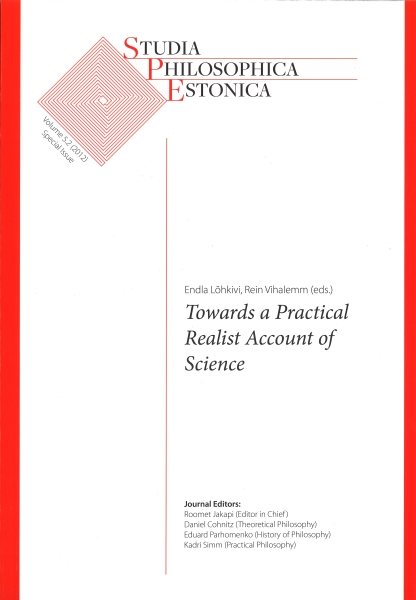The Changing Role of Scientific Experiment
DOI:
https://doi.org/10.12697/spe.2012.5.2.10Keywords:
experiment, non-repeatability, irreversibility, laboratory fictions, Prigogine, RouseAbstract
Practical realism is focused on the problem of how science really works. In the case of physics and chemistry, experiment is the centrepiece of scientific practice. The rapid development of contemporary natural science does not leave the experiment unaffected. The classical experiment is normally applied only to systems that can be considered structurally stable, repeatability being the key feature. After the introduction of the theoretical basis of irreversibility by Ilya Prigogine the essence of the experiment changed. The strict requirement of repeatability has to be dropped. It will be discussed, whether the change is big enough for calling it revolutionary. There are means to update the understanding of the experiment by applying the experimental settings. The material experiment will probably be with us forever but its position on the scientific landscape will be shifted.
Downloads
References
Cartwright, N. (1983). How the Laws of Physics Lie, Oxford University Press, Oxford.
Chang, H. (2004). Inventing Temperature, Oxford University Press, Oxford.
Fleck, L. (1979). Genesis and Development of a Scientific Fact, University of Chicago Press, Chicago.
Hacking, I. (1983). Representing and Intervening, Cambridge University Press, Cambridge.
Maxwell, N. (2010). Cutting God in Half–And Putting the Pieces Together Again. A New Approach to Philosophy, Pentire Press, London.
Müürsepp, P. (2010). Structural Stability as the Core of RenÉ Thom’s Philosophy, Lambert Academic Publishers.
Näpinen, L. and Müürsepp, P. (2002). The concept of chaos in contemporary science: On Jean Bricmont’s critique of Ilya Prigogine’s ideas, Foundations of Science 7: 465-479.
Prigogine, I. (1997). The End of Certainty, The Free Press, New York.
Rouse, J. (1987). Knowledge and Power, Cornell University Press, Ithaca.
Rouse, J. (2008). Laboratory fictions, in M. Suarez (ed.), Fiction in Science: Philosophical Essays on Modeling and Idealization, Routledge, New York, pp. 37-55.
Thom, R. (1975). Structural stability and Morphogenesis, W. A. Benjamin, Inc, New York.
Vihalemm, R. (2007). Philosophy of chemistry and the image of science, Foundations of Science 12: 223-234.
Vihalemm, R. (2011). Towards a practical realist philosophy of science, Baltic Journal of European Studies 1: 46-60.
Walker, I. (1983). Complex-irreversibility and evolution, Cellular and Molecular Life Sciences 8: 806-813.

